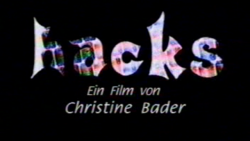Difference between revisions of "Hacks"
| Line 64: | Line 64: | ||
! style="background: #F8F8FF; color: #8B8989;"| NA | ! style="background: #F8F8FF; color: #8B8989;"| NA | ||
! style="background: #F8F8FF; color: #8B8989;"| | ! style="background: #F8F8FF; color: #8B8989;"| | ||
| − | ! style="background: #F8F8FF; color: #8B8989;"| [ Archive.org] | + | ! style="background: #F8F8FF; color: #8B8989;"| [https://archive.org/details/hacks_97 Archive.org] |
! style="background: #F8F8FF; color: #8B8989;"| | ! style="background: #F8F8FF; color: #8B8989;"| | ||
|- | |- | ||
Revision as of 16:12, 4 November 2022
| Hacks Title Card | |
| Format | Video (VHS?) |
|---|---|
| Genre | Documentary |
| Origin | EU |
| Language | German (English subtitled) |
| Release Date | 1 December 1997 |
| Running Time | 73 min |
| Production | |
| Created by | Christine Bader |
| Directed by | Christine Bader |
| Produced by | Christine Bader |
| Written by | Christine Bader |
| Screenplay by | Christine Bader |
| Distributed by | Bader Film |
| Narrated by | NA |
| Starring | Sven Gohdes, The Dude, Wau Holland, Marleen Stikker, Maurice Wessling, Rop Gonggrijp, Felipe Rotriques, Christian Wolff, Haneke Vermeulen |
| Music by | Andreas Kunzmann & Jin Choi |
| Cinematography by | Ulla Barthold, Bella Halben, Gabi Schwark & Christine Bader |
| Edited by | Michael Thaler |
| Production Company | Bader Film |
| Location(s) | Various |
| Original Channel | NA |
| Additional Information | |
| Based on | NA |
| Topics | Technology, Computers, Hacking |
| Follows | NA |
| Precedes | NA |
| Associated Video | NA |
| Website | NA |
Hacks is an English and German language documentary by Christine Bader. It was shot over a period of four years, starting in 1993 and released in 1997. This documentary deals with social aspects of hacking by covering not only the more traditional “computer” hacks, but expanding the definition to the realms of society, politics, environment, and art.
Synopsis
The documentary begins with a number of interviews attempting to discover meanings of words 'hack' and 'hacking'. From these interviews we begin to see that hacking has less to do with computer security or technology in general; instead it is a philosophy, a way of life, a creative realization of ideas. A hack is an elegant approach to a tricky problem.
The first segment describes FoeBud organization which creates public meeting places for people to socialize about technology and privacy. One of their projects is to set up a technoart stand at CeBit trade show in Hannover each year. Next we move to project Stubnitz, a ship converted to a work/live space for artists to work on projects.
We move back to technological aspects of hacking and spend time discussion the creation and inherent decentralized architecture of the Internet with Rop Gonggrijp and Wau Holland. As an example of Internet freedom, Felipe Rotriques, Haneke Vermeulen, and Marleen Stikker describe efforts of XS4ALL to bring access to the Internet to common people. One of XS4ALL's project is to create a community forum called Digital City where people can discuss various topics, exchange information and services.
In a more humane examples of hacking, we learn about Kommhelp and how they help handicapped with computer interraction.
Next we are taken by “The Dude” on the crash course in social engineering. We learn that as computers get more secure and complex, the weakest link in the chain becomes a human being. It is no longer worth spending months trying to get information by breaking into computer system, when it is possible to get that same information right from the source.
We learn about 'subversive way of thinking' from several CCC members, as well as about their exploits hacking into a bank in Hanover.
Again we are pushed to stretch the meaning of hacking by learning about Sea Shepherd and Paul Watson and his exploits as an environmental activist.
Next we jump to Hacking in Progress camp where Maurice Wessling explains its mission as a place for people to come together from all over the world in both technical and social sense. During the event there is a minute of silence due to the fake death of Bill Gates followed by unsuccessful attempts to call him about it. There are several other interesting interviews that take place during HIP, including the mysterious Tron hacker talking about hacking telephone and credit cards in Germany.
Overall this is a good, well through out documentary. While it tends to outstretch hacking to encompass environmental activism and artistic nonconformity, this documentary does contain an important message. 'It is not the question whether we should realize technology or not, the question is do we realize it by ourselves or should we leave it to the big industries.'
Downloads
| Film | User | Format | Link | Notes |
|---|---|---|---|---|
| Hacks (1997) | NA | Archive.org | ||
| Hacks (1997) | NA | MP4 | thesprawl.org | |
| Hacks (1997) | NA | M4V | media.defcon.org |
